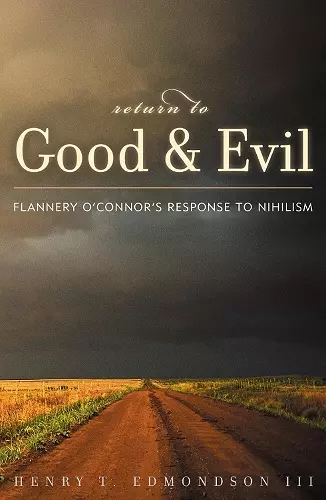Return to Good and Evil
Flannery O'Connor's Response to Nihilism
Format:Hardback
Publisher:Lexington Books
Published:24th Sep '02
Currently unavailable, and unfortunately no date known when it will be back
This hardback is available in another edition too:
- Paperback£42.00(9780739111055)

While Flannery O'Connor is hailed as one of the most important writers of the twentieth-century American south, few appreciate O'Connor as a philosopher as well. In Return to Good and Evil, Henry T. Edmondson introduces us to a remarkable thinker who uses fiction to confront and provoke us with the most troubling moral questions of modern existence. "Right now the whole world seems to be going through a dark night of the soul," O'Connor once said, in response to the nihilistic tendencies she saw in the world around her. Nihilism—Nietzche's idea that "God is dead"—preoccupied O'Connor, and she used her fiction to draw a tableau of human civilization on the brink of a catastrophic moral, philosophical, and religious crisis. Again and again, O'Connor suggests that the only way back from this precipice is to recognize the human need for grace, redemption, and God. She argues brilliantly and persuasively through her novels and short stories that the Nietzschean challenge to the notions of good and evil is an ill-conceived effort that will result only in disaster. With rare access to O'Connor's correspondence, prose drafts, and other personal writings, Edmondson investigates O'Connor's deepest motivations through more than just her fiction and illuminates the philosophical and theological influences on her life and work. Edmondson argues that O'Connor's artistic brilliance and philosophical genius reveal the only possible response to the nihilistic despair of the modern world: a return to good and evil through humility and grace.
"As ... Henry Edmondson... shows, O'Connor takes us through evil to good, through sacrifice to redemption, and through tragedy to comedy." -- Thomas Hibbs * National Review *
Edmondson's considerable philosophical and theological sophistication informs every page of his interpretations of O'Connor's stories. That interpretation is wonderfully intense and nuanced, because Edmondson is convinced that these stories might just be one way we can know the truth. Edmondson's book inaugurates a new stage in the scholarly appreciation of Flannery O'Connor. -- Peter Augustine Lawler, Berry College
To my knowledge, this is the best thing written on Flannery O'Connor. It is extremely valuable, insightful, and beautifully written; like O'Connor's stories themselves, it is hard to put down. It is a splendid introduction to first-time readers as well as a treasure for those who are well acquainted with O'Connor's works. . . . Professor Edmondson leads us to the heart of the stories with gracefulness and directness. -- Peter Kalkavage, St. John's College
Although it is widely appreciated that O'Connor was a serious Catholic, literary scholars do not explore what that means for her work with the depth that Edmondson undertakes here; neither have many of them spent the time he has examining and drawing conclusions from her library and letters. -- Charles Rubin, Duquesne University
This most illuminating book should become the standard against which past and future studies of O'Connor will be measured. Everyone mentions Nietzsche, but Edmondson seems to know his thought as intimately and as reliably as I imagine O'Connor did. We've long needed this more searching examination of O'Connor's bad angel. -- John E. Alvis, University of Dallas
With this lucid, compelling, and important book, Henry T. Edmondson III reveals Flannery O'Connor's prophetic poetry and explains her moral vision. He leads us into the heart of her fiction and exhibits a profound understanding of her intentions and of her theological sources. Moving adroitly among her stories, letters, and speeches—intrepidly tracking her every literary move—Edmondson makes it as hard for us, as it is for O'Connor's characters, to remain in 'some halfway position' on moral questions. He demonstrates, moreover, that O'Connor's 'Christian realism' is not for the faint of heart. She offers shock therapy for the morally obtuse and hard-edged truths to alarm the easygoing and sentimental. As Edmondson explains, O'Connor's stories show why the Nietzchean effort to expel good and evil, and God and the Devil, is doomed to fail—but she further shows that when this misadventure is abandoned, self-knowledge will return through grace. -- Pamela K. Jensen, Kenyon College
[Edmondson's] passionate and detailed explanation of O'Connor's intellectual 'devils' and mentors is useful, informative, and most welcome. * Cheers! *
Realigned, refreshed, and reinforced by Edmondson's distinctive exposition, we put down his study with our comprehension enhanced, ready once again to address ourselves to Flannery O'Connor. * Chronicles: A Magazine of American Culture *
For the newcomer, Edmondson's book offers a primer on O'Connor's wit and wisdom. For the seasoned reader, Return to Good and Evil offers a highly readable exposition of the philosophical and theological engagement of her stories. * Christianity Today *
Edmondson succeeds admirably in his chosen task of making explicit the vision that Flannery O'Connor dramatized so powerfully in her fiction. . . . One hopes that his achievement will lead others to read and write more abour O'Connor, and perhaps encourage even members of English departments to return to the kind of literary criticism exemplified so well in Return to Good and Evil. * Modern Age *
ISBN: 9780739104217
Dimensions: 235mm x 160mm x 23mm
Weight: 454g
224 pages